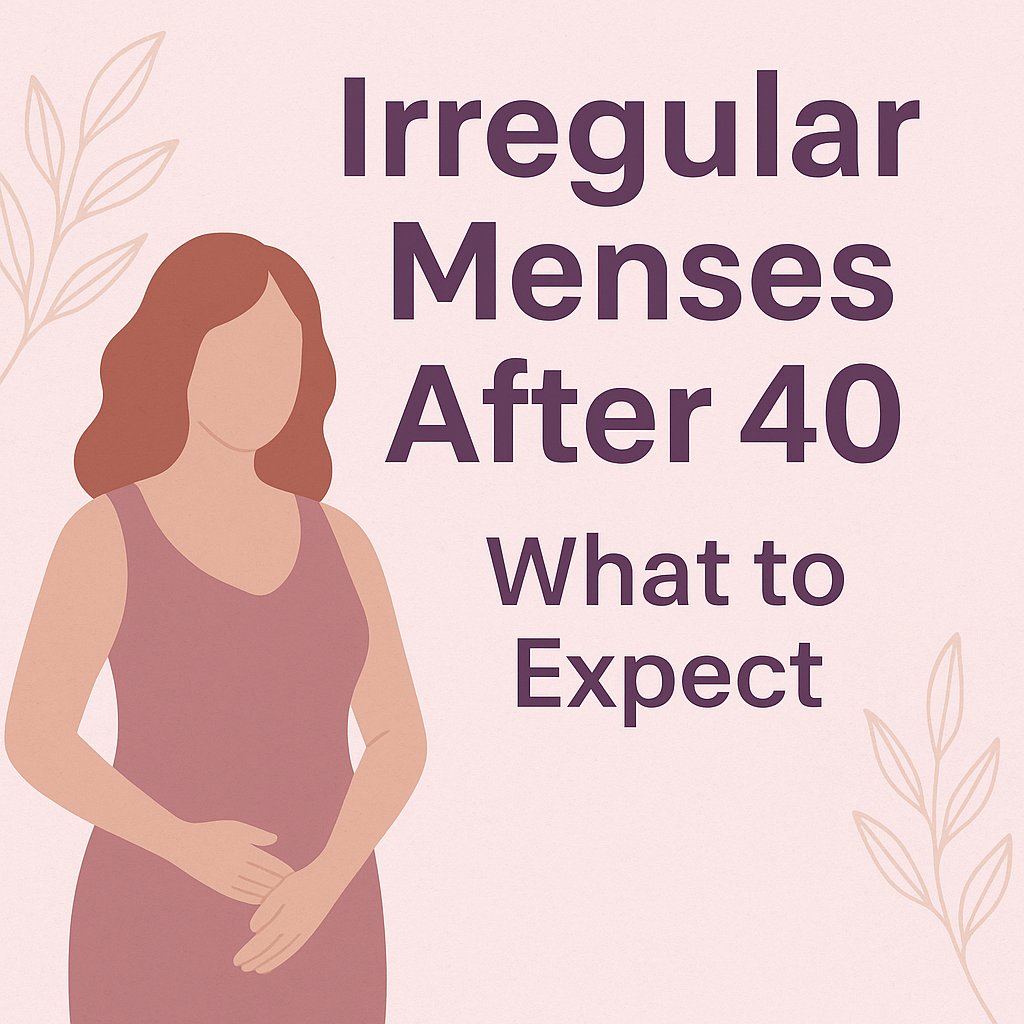Understanding What’s Normal and What’s Not
As women enter their 40s, menstrual changes are among the first signs that the body is transitioning toward menopause. Periods may become unpredictable — sometimes heavier, sometimes lighter, sometimes skipping a month altogether. While these fluctuations are often natural, they can also signal underlying hormonal shifts or health issues that deserve attention.
Let’s understand why this happens, what’s considered normal, and when to seek medical advice.
1. The Perimenopause Phase: A Time of Transition
The years leading up to menopause are called perimenopause, typically starting between age 40–45 and lasting 4–8 years. During this time, estrogen and progesterone levels begin to fluctuate unpredictably. These hormonal shifts affect the ovaries’ ability to release eggs regularly, leading to irregular ovulation and hence, irregular periods.
Common changes include:
-
Cycles becoming shorter (less than 21 days) or longer (more than 35 days)
-
Missed or skipped periods
-
Spotting between cycles
-
Heavier or lighter bleeding
-
PMS symptoms that feel more intense
2. What’s Happening Inside Your Body
Several hormonal and structural changes contribute to irregular menses after 40:
-
Erratic Ovulation: As follicles age, ovulation doesn’t happen every month, causing delayed or skipped periods.
-
Estrogen Dominance: When ovulation fails, progesterone dips but estrogen may remain high, resulting in heavy or prolonged bleeding.
-
Falling Estrogen: At other times, low estrogen levels can cause shorter, lighter, or missed cycles.
-
Thyroid and Metabolic Changes: Thyroid dysfunction, insulin resistance, or weight gain around this age can also disrupt regular cycles.
-
Endometrial Changes: The uterine lining becomes more sensitive to hormonal fluctuations, increasing the chance of spotting or clots.
3. Common Symptoms Alongside Irregular Periods
Many women experience other perimenopausal symptoms due to hormonal changes:
-
Hot flashes or night sweats
-
Sleep disturbances
-
Mood swings or irritability
-
Breast tenderness
-
Weight gain (especially around abdomen)
-
Hair thinning or dryness of skin
-
Decreased libido
-
Vaginal dryness or discomfort
4. When Should You See a Doctor?
While irregular periods after 40 are often due to natural hormonal shifts, certain patterns warrant evaluation to rule out conditions like fibroids, endometrial hyperplasia, thyroid dysfunction, or early menopause.
Seek medical advice if you notice:
-
Bleeding that’s unusually heavy or lasts >7 days
-
Periods that occur more often than every 21 days or skip for >3 months
-
Large blood clots or severe cramps
-
Post-coital bleeding (after intercourse)
-
Unexplained weight loss, fatigue, or hair loss
Your doctor may recommend blood tests (FSH, LH, TSH, prolactin) or a pelvic ultrasound to assess hormonal and structural causes.
5. Lifestyle Support During This Phase
Hormonal fluctuations can be balanced — at least partially — through nutrition, stress control, and consistent exercise.
Here’s what helps:
Diet
-
Focus on whole grains, leafy greens, seeds (flax, pumpkin, sunflower), and plant-based proteins.
-
Reduce caffeine, sugar, and refined carbs that aggravate estrogen swings.
-
Include calcium and vitamin D–rich foods for bone health.
-
Stay hydrated and limit alcohol intake.
Exercise
-
Combine strength training, yoga, and aerobic activity for hormonal balance and metabolic health.
-
Mindful movement like yoga or tai chi reduces stress and improves sleep.
Stress and Sleep
-
Practice mindfulness or deep breathing.
-
Ensure 7–8 hours of quality sleep — poor rest amplifies hormonal chaos.
Ayurvedic & Natural Support
-
Ashwagandha for stress and cortisol balance
-
Shatavari for female hormone regulation
-
Triphala for digestive and metabolic support
(Always discuss herbal use with your doctor if you’re on medication.)
6. What to Expect Moving Forward
Perimenopause doesn’t mean an immediate stop to fertility or femininity — it’s a gradual, natural transition.
Most women reach menopause (no periods for 12 consecutive months) between age 45–55.
Tracking your cycles, maintaining a hormone-friendly lifestyle, and getting regular health checks can help you glide through this phase with confidence.
Key Takeaway
Irregular menses after 40 are your body’s way of signaling a shift.
Instead of worrying, see it as an opportunity to tune in — nurture your hormones, strengthen your body, and prepare for the next chapter of health and vitality.

Akanksha Sharma
Dr. Akanksha Sharma, Head Writer and creator of AtoZ of Pregnancy, is dedicated to empowering women, parents, and families through 360-degree knowledge. She and her team provide evidence-based advice to guide families through pregnancy, parenting and beyond.






